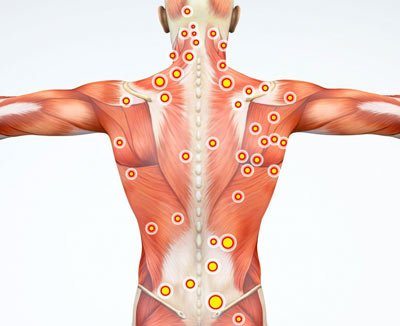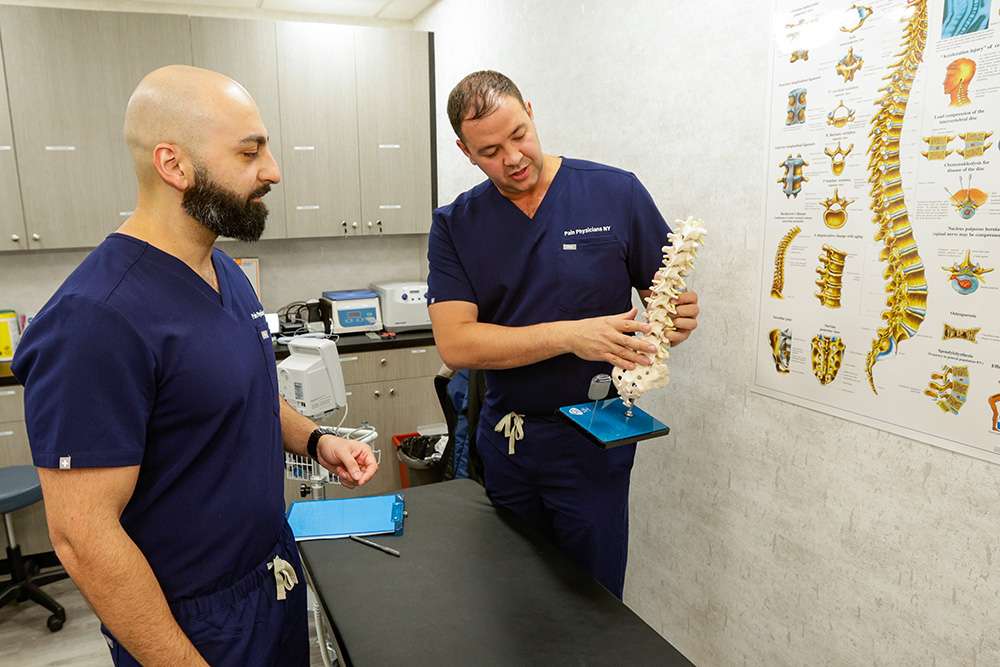Fascia is the connective tissue that holds your muscles and organs in place. Normally, you don’t even realize it’s there. But if it becomes inflamed and sensitive, it creates trigger points that are extremely painful when touched. Myofascial pain syndrome is a chronic condition where trigger points continue to be active and cause painful muscle spasms. Don’t settle for just a muscle spasm treatment; resolve the underlying myofascial pain syndrome at pain management NY.
Myofascial pain syndrome is a term used to describe a specific type of muscle pain caused by swelling and inflammation in your body’s soft tissue. This connective tissue, called fascia, covers the muscles and organs under your skin. Fascia keeps your muscles and organs in place so your body works properly.
When your fascia becomes inflamed, either at a single muscle or around an entire group of muscles, myofascial pain results. Myofascial pain syndrome is typically a chronic condition, and it can be misleading. The area of your body that hurts isn’t always the actual source of your pain. Cases like this are known as referred pain, and only a skilled pain management specialist in NYC can determine the source of your pain.
Causes of Myofascial Pain
When your muscles become sensitive from overuse or injury, they can develop areas where the fascia has tightened. These areas are tender to the touch, so they’re called trigger points. While the initial pain of an active trigger point fades with time, it can become a latent trigger point that causes reawakened pain in the same spot or restricts your movement, especially when the pain is in your back.

- Repetitive motions
- Muscular injury
- Poor posture
- Extended periods of muscle inactivity, like from wearing a cast
Stress and anxiety sometimes contribute to myofascial pain. Tension and stress cause repeated or constant muscle strain, especially in your shoulders and in your neck. If you’re constantly under stress, your chances for developing trigger points increase dramatically.

Diagnosing Your Condition
Muscle pain in your back is common. But if your pain persists, it’s time to consult an injury doctor in NYC. The top-rated pain management doctors in New York are available at center of pain New York. Your pain doctor begins your exam by seeking areas of muscle tension, guided by your description of the pain. By applying gentle pressure with his fingertips, your pain specialist locates your trigger points.
Your pain management physician may recommend additional tests — using the most advanced diagnostic equipment — to rule out other causes. X-rays, magnetic resonance imaging (MRI) or CT scans may all come into play. Once the source of your chronic pain has been accurately diagnosed, it’s time to discuss a myofascial pain treatment.
Myofascial Pain Syndrome Treatment
The best back pain specialists in Midtown at Pain Management NYC offer a variety of treatments that are custom-fit to address your pain and lifestyle. The top-rated New York pain management physicians are board-certified in their specialties and focus on delivering the latest in pain treatment options. To start, massage and physical therapy may be appropriate to help relax your trigger points.
But the best myofascial pain therapy and treatment for muscle spasms are achieved with specialized injections. They produce a level of myofascial pain relief that used to be impossible, so the benefits far outweigh any short-term discomfort. These pain injection treatments include:
- Trigger point injections. Your pain doctor injects either saline or local anesthetic directly into your trigger point. Relief can come in an instant.
- Cervical epidural steroid injections. If your neck or upper back pain stems from myofascial pain, an epidural injection with steroid medicine treats the inflammation and pain at the same time.
- Thoracic epidural steroid injections. If the myofascial pain is located in the middle of your back, your pain management physician may recommend an epidural in that region.
- Lumbar epidural steroid injections. If the severity of your lower back muscle strain or injury warrants it, your physician may opt to inject steroids into the trigger point in your lumbar region.
Myofascial pain therapy can resolve your pain immediately. Once the steroidal medicine reduces the inflammation of your fascia, your pain fades with it. Myofascial pain syndrome won’t go away permanently on its own. Seek a top professional pain clinic in Manhattan at Pain Management NYC.

Leon Reyfman, MD, is a top-rated, best-in-class interventional pain management doctor. He is a nationally recognized pain relief specialist and is among the top pain care doctors in New York City and the country. He is an award-winning expert and contributor to prominent media outlets.
Dr. Leon Reyfman has been recognized for his thoughtful, thorough, modern approach to treating chronic pain. He has been named a “top pain management doctor in New York” and one of “America’s Top Doctors™” for advanced sports injury treatments. Among other accolades, he was voted by peers as a “Castle Connolly Top Doctors™” and “New York Super Doctors™”. Dr. Leon Reyfman was a part of the medical team at the 2016 Summer Olympic Games in Rio de Janeiro, Brazil.
